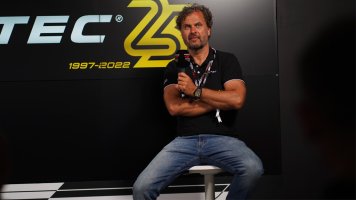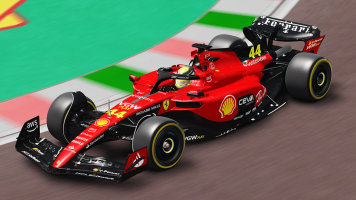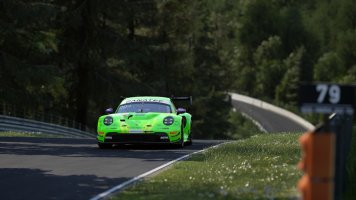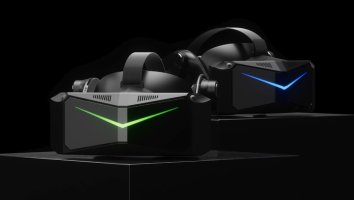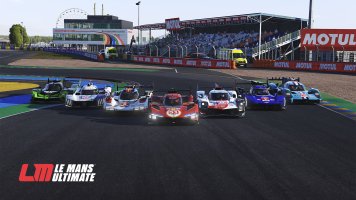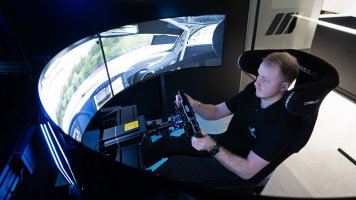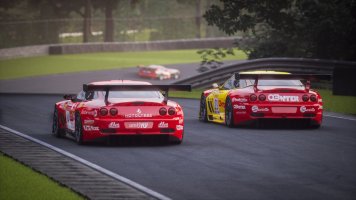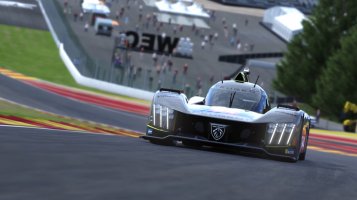The GT4 European Series is now well under way, however there is another competition happening within the GT4 series you may not know about - the Reiter Young Stars (RYS) Cup. The Young Stars Cup is made up of eight teams composed of race engineering and marketing students, paired with young drivers competing for a paid drive in next year’s Blancpain Sprint Series. Team Holinger features Seb Wedgwood along with Roberts Ramanis as engineers, Seb Scott (who worked with RD as an F1 journalist last year) as Team Manager and Lennart Marioneck and Timothy Stupple as the drivers.
RD: Seb, I understand you have some prior experience in GT racing as well as the Formula Student competition. Can you tell us a bit more about that?
SW: "I really got into motorsport by doing a college course [at] Wiltshire College here in England. Through that I ran a Formula Ford car, and I started out there helping out during a few races, doing testing, just kind of doing, you know, little jobs here and there. Nothing too serious. But soon, that kind of led on to a position in British GT. So, there we ran a V8 Vantage GT4 car, and once again the position – I was a tyre technician, so you know, [I was] learning the basics, learning the ropes of racing really.
"But yeah, I mean it was a great experience to just learn how a weekend works in terms of the work which is put in, and the responsibilities of different people – because you hear and you understand what different roles do, but until you’ve actually worked on a race team, you just don’t have a full understanding of it. And that’s what kind of gave me that baseline knowledge and experience to be able to go on and do bigger and more complicated things."
RD: So how does the RYS Cup vary from those kinds of competitions?
SW: "The RYS Cup is such a unique experience. I mean like you said in your introduction it’s a competition between engineers and drivers, so from an engineering perspective we’re scored in different areas: from team radio to how we communicate with the mechanics, how well we set up the car. And that scoring system is really quite unique because you get conflicting interests within the championship, so in some respects you want to win, and in some respects you want to race for the RYS Cup. Because the drivers, they are not scored on race position, but on their five fastest lap times averaged out to get the score.
"So let’s say that you’re in third position and you hit traffic.You could either drop back and then get the five fastest lap times and do alright in the RYS cup, or you could maybe push for a podium. So… you get these conflicting decisions and that from and engineer’s perspective [is] an interesting dilemma. In some respects you want to keep the drivers happy – because he’s really after the RYS Cup because he wants that drive in the Blancpain Sprint Series – but in some respects you want to keep the, you know, the commercial partners at Holinger, you want to keep them happy by doing well in the GT4 Series."
RD: So how often do you find yourself actually making those kinds of sacrifices?
SW: “It’s every single session and every single race… Our last round, Spa, we had an early drive through penalty. Straight away, that put us down the grid quite far, and we decided… let’s drop back, let’s find some free air, let’s get the five fast laps in, and then let’s really go and push. And eventually we got a podium, but yeah, it’s really every single race we’re there making those decisions.”
RD: Team Holinger is currently tied for 5th in the GT4 Series, with their drivers sitting in 5th as well in the GT4 Pro class. In the Young stars cup, however, Lennart Marioneck is in 2nd amongst the men and Timothy Stupple is in 6th. Your Team, hailing from the University of Hertfordshire is in 4th overall, down by just 23 points from 1st. You have two rounds left: Hungaroring in September and Circuit Park Zandvoort in October. How difficult is it going to be for you to try and make up those points and steal the win in the two remaining rounds?
SW: "Yeah, it’s definitely going to be a big challenge. It is quite interesting, because the points don’t tell the full story really, because at the end of the competition we will also combine our marketing points. So the teams were also scored on how well they do through social media, and external media and those points combine at the end of the season. So we’re doing really well in the marketing and hopefully, when combined, that will push us up slightly. And then, if we have a few clean races I don’t see any reason we can’t push for a win. Our last race was Spa, it was a very difficult weekend, we had lots of different issues and that kind of, really hurt us.
"But… I don’t see any reason we can’t improve the next few rounds. And I think with the RYS Cup it’s a learning experience; every single round, you’re learning. I mean when we got to Monza we had never ever run a race car before - I mean both myself and Howard at the time had both worked in race teams – but actually running it is a lot more difficult and there is a lot that can go wrong. At each round, we have definitely improved, and we’ve learnt something, so I mean we’re only going to get better… and I don’t see any reason why we can’t push for the win."
RD: So if you do pull off the win, what will that mean for you specifically? What impact with it have on your career?
SW: "The winning prize for the best engineers and team managers is to support the winning drivers in the Blancpain Sprint Series. So myself and Robert would both be race engineers within a Blancpain Sprint Series. Now, being only twenty myself, I mean that’s quite a big achievement and it would definitely help me looking for future roles. It would be quite difficult because I am personally starting a placement with Mercedes-AMG HPP – doing the Formula One engines – in September so I would have to take all of my holiday to do the racing."
RD: What is it like to come onto these legendary circuits and do the track walk for the first time, what is the atmosphere like?
SW: "It’s surreal. It’s a very weird experience. I mean, Tomáš Enge - who’s [an] ex-Formula One driver, and he’s driven Le Mans, and he’s a very experienced guy – he always does the track walks with us, and you learn so much. And that’s the thing, as well as it being amazing being places like Spa and legendary circuits, you lean so much and you really get to appreciate why a track walk is important. You know, seeing where it’s bumpy, seeing how the kerbs have changed. It’s all the little things like that which really make the track walk so important and also make it just a great experience."
RD: "You know, I think that’s something that people don’t always realize, is that when you do that track walk you’re not just walking it to see where the turns are going. You really need to look, you really need to be paying attention to what you are doing."
SW: "Our last race, Spa, they put these big black - well Tomáš Enge called them ‘black boobs’ - these big black lumps on the kerbs and if you just kind of assume that you thought, well I know where the track is I don’t need to walk it, you wouldn’t have seen how big those bumps actually were. In the race you hit one, and that’s your suspension done. So it is, definitely, a critical part of the weekend, the track walk."
RD: So, when it comes to race day then, and you are now in the pit on these legendary tracks, what is that atmosphere like?
SW: (Laughs) "Nervous, that’s the first thing. Nervous, exciting, it’s a strange moment because before the race everything’s very calm. You know, you’re prepared, you’re ready and then about, probably ten minutes before the car leaves everything starts to kind of wind up… You start throwing the cars up and the atmosphere just changes. It goes from being very calm to extremely tense, extremely nervous. You can see it with the drivers, with the engineers, everybody – the mechanics who have to do the pit stops.
"But it’s amazing, that’s the other thing. At the time you get so wrapped up in it, you kind of forget who you are. You’re just wrapped up in this mini-world of racing and the excitement of it, the adrenaline. And then afterwards, once the race gets going you kind of take a few, you know some deep breaths. You kind of calm down, manage the race and you kind of, yeah just go from there… Just before, when the cars are firing up, that’s when it really hits you, kind of, Oh my god. What am I doing?"
RD: "It certainly sounds incredible. It’s interesting how the RYS competition takes you as a student, and sort of puts you in the big league. You are right in it, and even though you are still working toward that career, you get a firsthand taste of what’s to come."
SW: "Definitely. You can compare it to something like Formula Student, where Formula Student is a design competition. So they’ll test you as a design engineer, maybe as an electrical engineer, but there’s nothing out there which really kind of puts you [in] on the spot pressure like the Reiter Young Stars Cup, and that’s kind of the key thing with it. It puts you into experiences which you would never ever, ever be able to get in the classroom… They’re not going to teach you what to do when the car won’t fire up five minutes before the start of a race. They don’t teach that stuff and you learn by making mistakes and you learn by doing it and that’s what the RYS cup gives you."
RD: It’s also really interesting to me because you have the RYS Cup, which is essentially between KTM X-bow GT4’s, but you are racing against the entire GT4 field.
SW: "It’s definitely a cool experience when you’re seeing, Aston Martins [and], you know, Maseratis fly by. These are cars you really aspire to owning one day and you just love and to be racing against them is one of the coolest things out there. And I think that’s the key to GT racing. Single seaters are always thought of as the pentacle of motorsport, but the more I work in GT racing, the more I love it and the more I want to work in it… Just being with these cars is making, you know, you fall in love with them."
RD: That leads me to the next question I know many of our readers will be wondering, do you as an engineer ever get to drive any of these cars?
SW: "Well occasionally maybe drive them around the paddock, but I don’t think they will let us drive on the circuit in them… I think one kind of key area to being [a successful engineer] – if you look at the best engineers out there… – they all do have some racing experience. So that’s something that all engineers should try and maybe do at some point in their life, you know, and try and get some experience behind the wheel, because it gives you that understanding… but the teams wouldn’t fund us to do that. And that’s where sim-racing comes in. I mean even, you know, games like Assetto Corsa or iRacing, they’ve got laser-scanned tracks. You can use these to try and get, you know, a little bit more of an understanding, and I’ll do that before we go to a racetrack. I’ll load up the racing simulator and see what I can learn."
RD: Before you began your career, did you have any experience with personal racing simulators?
SW: "I think what got me into motorsport was games like F1 2010, I remember that was really the first kind of racing game I got into. I think that’s what kind of inspired me to, I found my passion and I saw an opportunity to do it as a career and I jumped on it really."
RD: In recent years we have also seen an increased emphasis on professional simulators being used by racing teams, do you have any experience with these types of simulators?
SW: "Yeah, so at our university, we have a Cruden simulator. Yeah, the Cruden simulator’s big, it’s got these huge hydraulic jacks which give full motion. It’s got three screens and a proper steering wheel, pedals and then you can output the data directly our screens, so you can have a driver and then we can be monitoring the data while they are doing a session. And the simulator we have, it’s not so good for things like monitoring tyre wear, it’s not that detailed, but it is great for improving the driver and learning the lines and looking where the drivers can improve. I think that’s maybe one area our team could improve to do some proper simulation of different setups and that’s one area which is a bit more difficult to do. But in terms of driver improvement, yeah definitely."
RD: Overall, would you say that racing simulators – more specifically sim-racing on a casual level – is a good thing for the future of motorsport?
SW: "I one hundred percent believe that sim-racing can have a huge impact on motorsport. Both for inspiring people, getting people involved, betting people an understanding of a race weekend. There’s so much you can do with these games as they improve, I mean, little things like outputting the data into a log file which you can then open up MoTec and then read the log file, as I would on a race weekend with real data. You know, people who have never touched a race car can learn how to do that through sim-racing… I don’t see any reason it can’t promote racing, it can’t promote engineering, it can’t help us in the future. Especially with things like VR coming; it will make it even more exciting and better and more involving.
"I don’t know if that’s kind of a fresh generation thing, I suppose I’m one of the first generations to really grow up with a good level of, axis in sim-racing. If you speak to anybody, any of my friends in my position they can all see the benefits of a good race simulator on your personal computer. I definitely learn a lot of little things, like when you go to set up a car on a sim-racing program, it tells you what all the different changes do. And that’s how I learned what a damper change does, it can be used, it’s such a great educational tool out there. And then to be able to actually go out and drive it and feel the difference, you can actually, Okay, that’s what that means."
RD: Last but not least, there’s a question which we’ve all been wondering. What’s it like to race against a Playboy Playmate?
SW: (Laughs) "It’s good as long as we beat her."
RD: From all of us here at RaceDepartment, as well as myself, thank you for your time and good luck to you and the rest of your team moving forward!
SW: "Yeah thank you. And I mean, RaceDepartment, I’m a big fan of it. I use it every day so, yeah, great work with it."
As you can see from the above interview, the RYS Cup is a truly unique competition and an excellent learning experience for drivers, engineers and race marketing students alike. You can watch the GT4 European Series online free of charge, so be sure to catch the final two rounds - Hungaroring 22-25 of September, and Zandvoort 06-09 of October - and cheer on our friends at RYS Team Holinger.
Photos courtesy of Team Holinger
Last edited:


